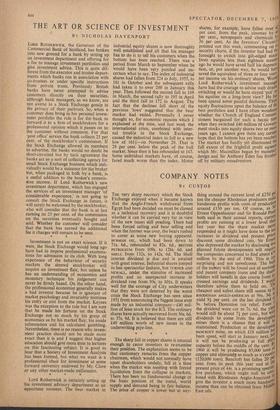COMPANY NOTES
BY CUSTOS
THE very sharp recovery which the Stock Exchange enjoyed when it became known that the Anglo-French withdrawal from Egypt had been decided on must be classed as a technical recovery and it is doubtful whether it can be carried very far in view of the new issues still pending. There had been forced selling and bear selling and when the former was over, the bears rushed to cover as some new buying appeared. BURMAH OIL, , which had been down to 71s. 6d., rebounded to 82s. 6d., BRITISH PETROLEUM from 109s. to 126s. 6d. and SHELL from 132s. to 142s. 6d. The Shell interim dividend is due and is awaited with great interest. Industrial shares jumped in less spectacular fashion, but TURNER AND NEWALL, under the stimulus of increased profits and an unexpected increase in dividend rose from 93s. to 101s. It speaks well for the courage of City underwriters that they were not deterred by the worst crisis the Stock Exchange has seen since 1951 from announcing the biggest issue ever made by an industrial company—£40 mil- lion of loan stock for the ICI. The ordinary shares have actually recovered from 36s. 6d. to 37s. 9d. It is believed that there are still £40 million worth of new issues in the underwriting pipe-line.
*'
The sharp fall in copper shares is unusual enough to cause investors to re-examine their position. The explanation seems to be that cautionary remarks from the copper chairmen, which would not normally have upset shareholders unduly, fell at a time when the market was meeting with forced liquidation from the collapse in markets. There has been no fundamental change in the basic position of the metal, world supply and demand being in fair balance. The price of copper is lower but at any-
10V
tion Sir otin rent than ever
100
ice! ne51 the' vire
£5°
901
NO'
inln are' otii. The 3 be tO• a 041 n with pini be rho
bol
10111 0Y
• f 0 Per thc ulr 0111" n to ogle ddl°
thing around the current level of £270 ton the cheaper Rhodesian producers I) handsome profits with costs of produc around £150 per ton. Of course, as Ernest Oppenheimer and Sir Ronald P both said in their annual reports, cur profits are running at a lower level last year• but the share market n responded as it might have done to the increases in dividend and present pi discount some dividend cuts. Sir El also depressed the market by disclosing planned future developments will re the the companies concerned to find about million by the end of 1960. This is surprising and not unwelcome. The 1 of the money will be found out of earn and parent company loans and the holders will benefit in due course fro n creased earnings and dividends. I WI therefore advise them to hold on. cheapest and safest share still seems ti RHODESIAN ANGLO-AMERICAN at 96s. 3c yield 9-1 per cent. on the last divider 9s. before Dominion tax relief. Eve the dividend were cut to 7s. 6d. the 3 would still be about 71 per cent., but dividends to come from the develo mines there is a chance that it will maintained. Production at the develo BANCROFT mine, on which £18 million been spent, will start in January next, it will not be producing at full capacity before the middle of the year 1960 it will be producing 85,000 ton copper and ultimately as much as N'cHA (120,000 tons). Bancroft has fallen 20 cent. from its peak this year and at present price of 44s. is a promising spec tive purchase, which might well be c bined with Rhodesian Anglo-America' give the investor a much more hands. income than can be obtained from MI' East oils.


































 Previous page
Previous page